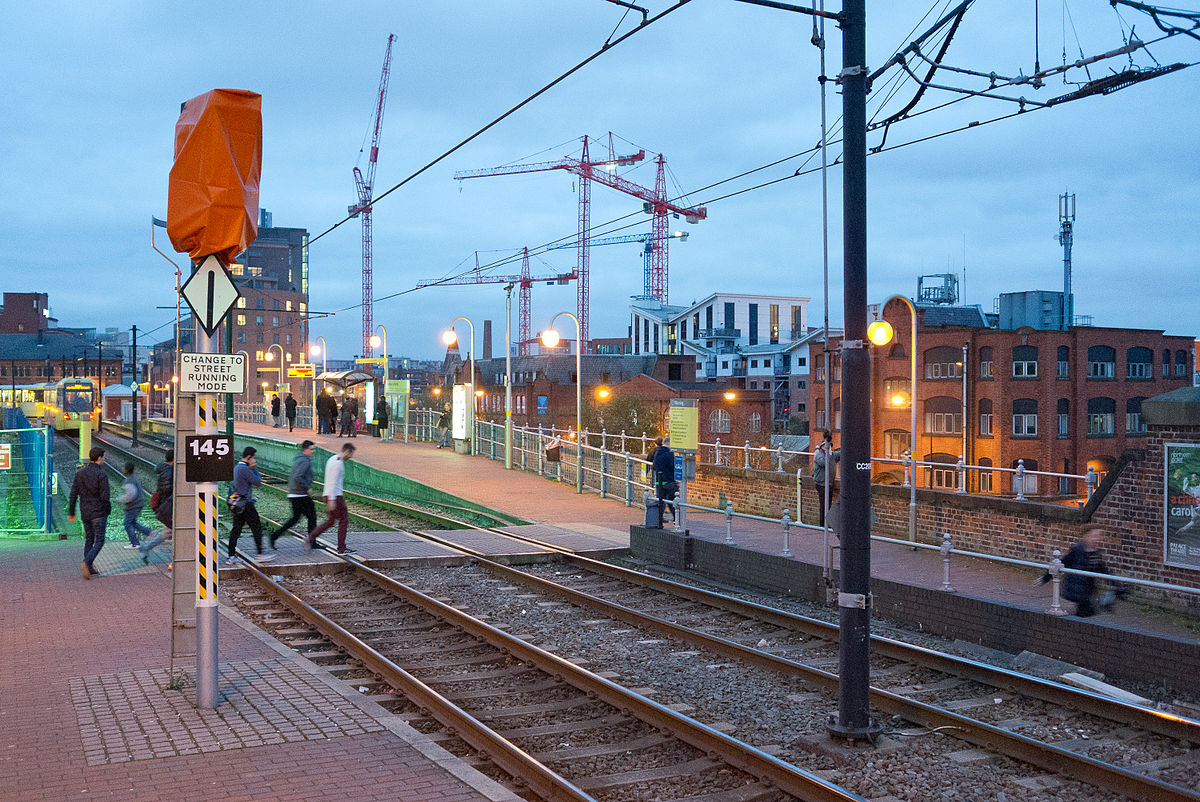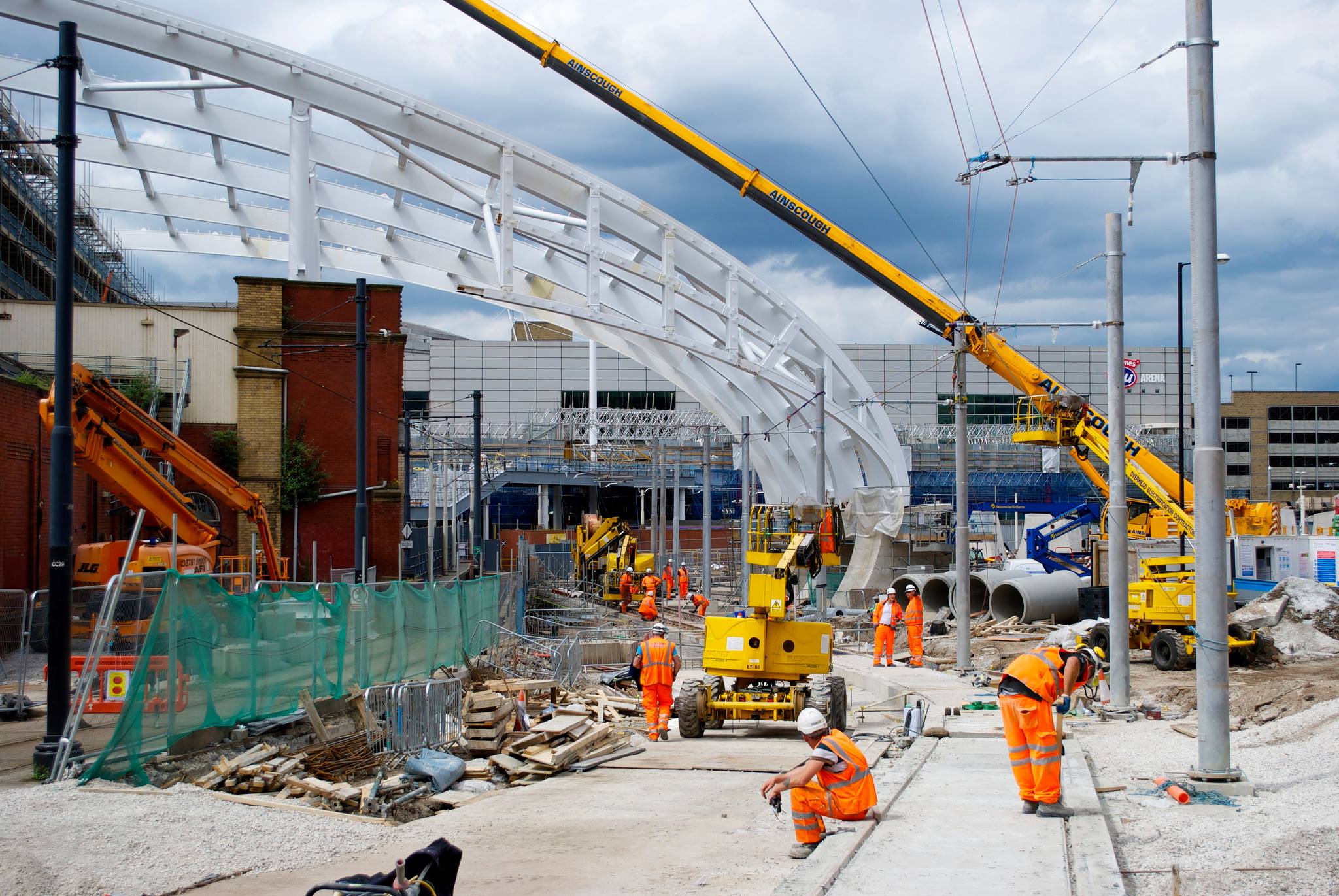Manchester's tram system has benefited from over £10 million in EU grants to construct a second tram line through the city centre, as well as £500 million in cheap loans from the European Investment Bank (a specific financial institution of the EU) to construct and equip new lines out to the suburbs of Ashton, Wythenshawe, Rochdale and East Didsbury.
Manchester's Metrolink tram system is operated by 120 Bombardier M5000 light rail vehicles (LRVs, colloquially known as trams). These are built in Austria and imported into the UK, currently free of tariffs because of the UK's

membership of the European customs union. In 2014, Transport for Greater Manchester (TfGM) were able to purchase 16 LRVs at a cost of £34 million. This order was originally for 12 vehicles but a combination of the bulk order placed by TfGM and the strength of the pound against the euro at the time enabled the order to be increased by four vehicles. If the UK leaves the EU without any sort of trade deal and has to resort to purchasing from the EU on World Trade Organisation terms, and assuming that the tariffs schedule we set up in that instance mirrors the existing EU schedule on external trade (which it is likely to do, in order to avoid triggering trade disputes with other WTO members) then these trams would be subject to import tariffs of 1.7%. The rules of the WTO mean we can't just eliminate these kinds of tariff on imports from the EU: we would have to do it for imports from the rest of the world as well, with no guarantee that all other countries would likewise remove their import tariffs on goods they import from us. Other essential items used by the Metrolink tram system such as copper wire, electronic equipment such as signalling apparatus, track components such as points or special metal castings needed for complex junctions and radio systems (for communication between staff out on the system and the Metrolink control centre) may attract tariffs of up to 14% if UK suppliers of compatible equipment cannot be found.

More importantly the Metrolink system has been the recipient of substantial amounts of EU funding to build new infrastructure and increase capacity. Metrolink's Deansgate-Castlefield stop was rebuilt from a simple two through platforms layout to a three platform design incorporating turnback facilities to allow trams to terminate from the south side of the city and turn back to destinations such as Altrincham or the Wythenshawe area. This facility was used extensively during the rebuilding of the city centre St Peter's Square stop in 2015-16 and is retained both for regular services as well as unscheduled turnback of late running services or in case of blockage of the city centre routes. The stop was rebuilt on a slightly different site with wider platforms and better shelters offering a better passenger environment. New lifts and a new bridge to Deansgate railway station were constructed as part of the project.

Part of the same overall project was the rebuilding of the tram stop incorporated into Manchester Victoria station. Prior to this rebuild the Metrolink area of Victoria was a single island platform offering two platform faces. To increase capacity prior to the enhancement of services following from the later opening of the second city crossing tram route across Manchester city centre the stop was rebuilt in 2014-15 as two island platforms with a centre track between, allowing for future services from the city and points south to terminate at Victoria and turn back.

These improvement works were part of a package of works to build the Second City Crossing; a short but highly strategic new tram line from St Peter's Square via Exchange Square (a new stop built to serve the Arndale shopping centre) to Victoria. This provides for an increased frequency tram service across the city centre and permits the existing Manchester Airport service to cross the city to terminate at Victoria in future, as well as providing paths for the forthcoming Trafford Centre line service to run through the city centre, relieving pressure on the First City Crossing via Mosley Street. The European Regional Development Fund contributed £10.8 million to the project and helped to accelerate the construction of the new facilities. The opening of Exchange Square stop in December 2015 was made possible by the EU grant. The area of Exchange Square was additionally redeveloped using £21.5 million of EU funding (equivalent to over £30 million in 2017 prices) in the aftermath of the 1996 IRA bomb attack.
Metrolink's "phase 3" lines to Ashton, Rochdale, East Didsbury and Manchester Airport were financed in part via a £500 million loan from the European Investment Bank. The EIB is the non-profit long term lending institution of the EU which offers loans at low interest rates to EU member states for projects such as infrastructure development and private sector development. In the period 2006-11 it offered over £17 billion in funding for UK projects. The Metrolink expansion loan was described by the EIB as part of the Bank's aim to support sustainable public transport in leading European cities and to reduce reliance on private car use. The loans, over a 30 year term, were used to construct new lines and to purchase further trams. These loans are at much more attractive interest rates than commercial lenders can offer and the ability of government agencies such as Transport For Greater Manchester to take advantage of these cheap infrastructure enhancement loans would be in significant doubt if we left the EU.
